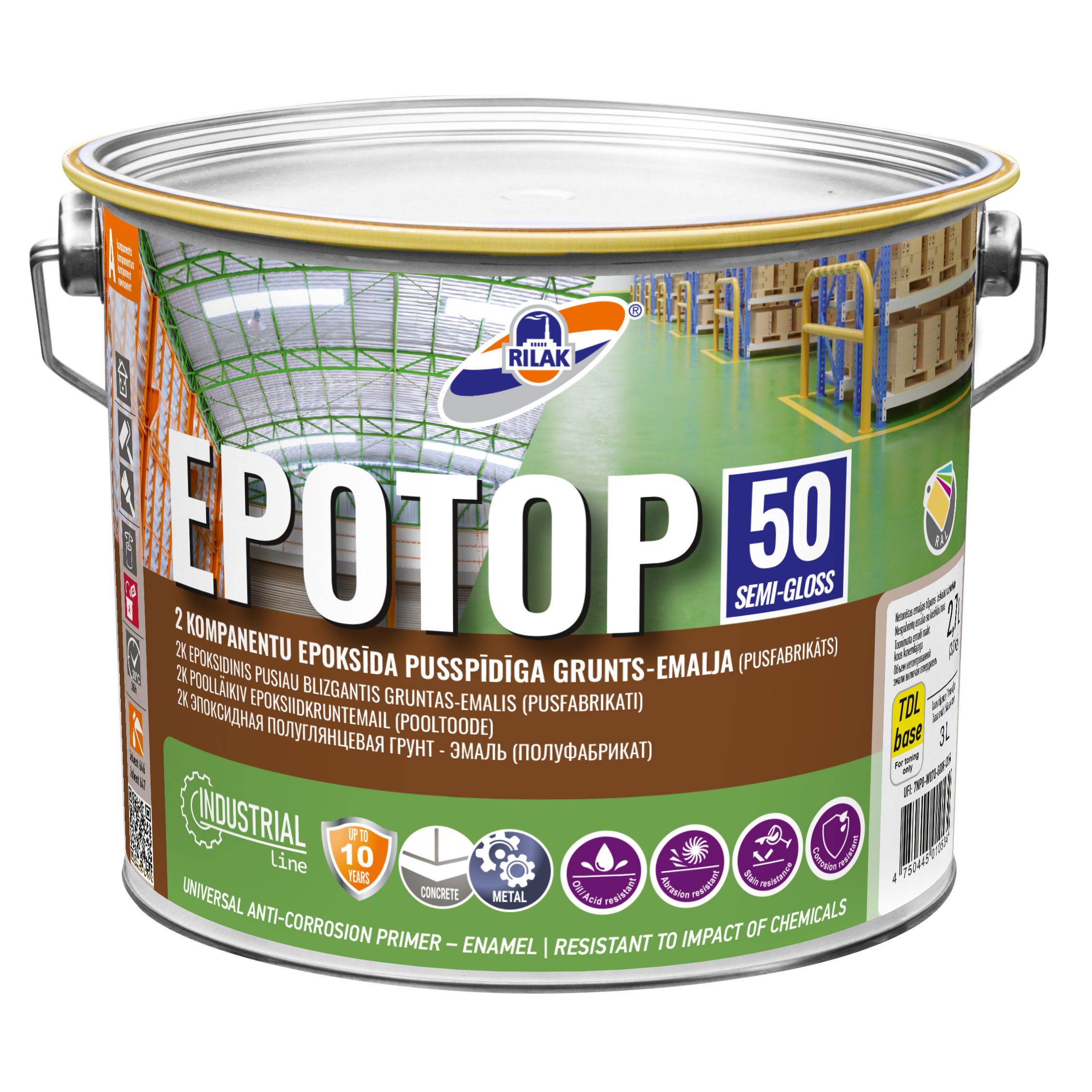
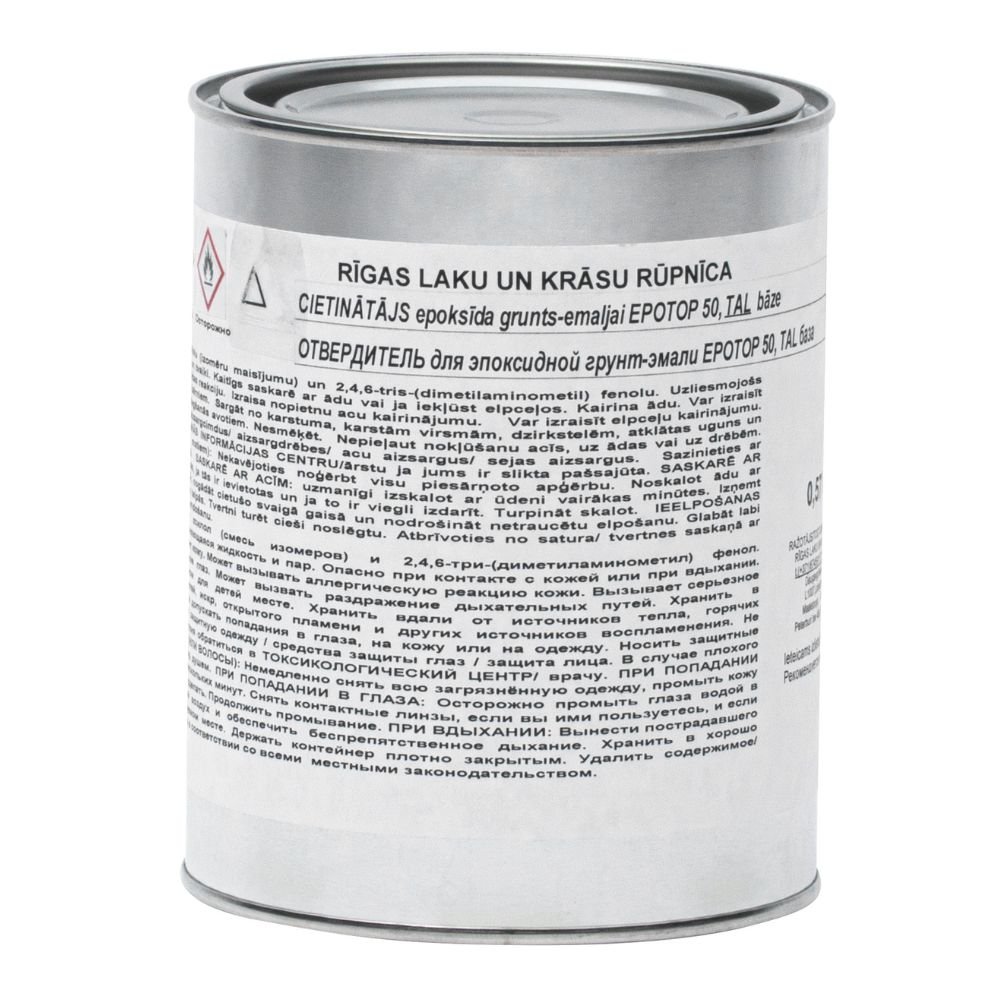
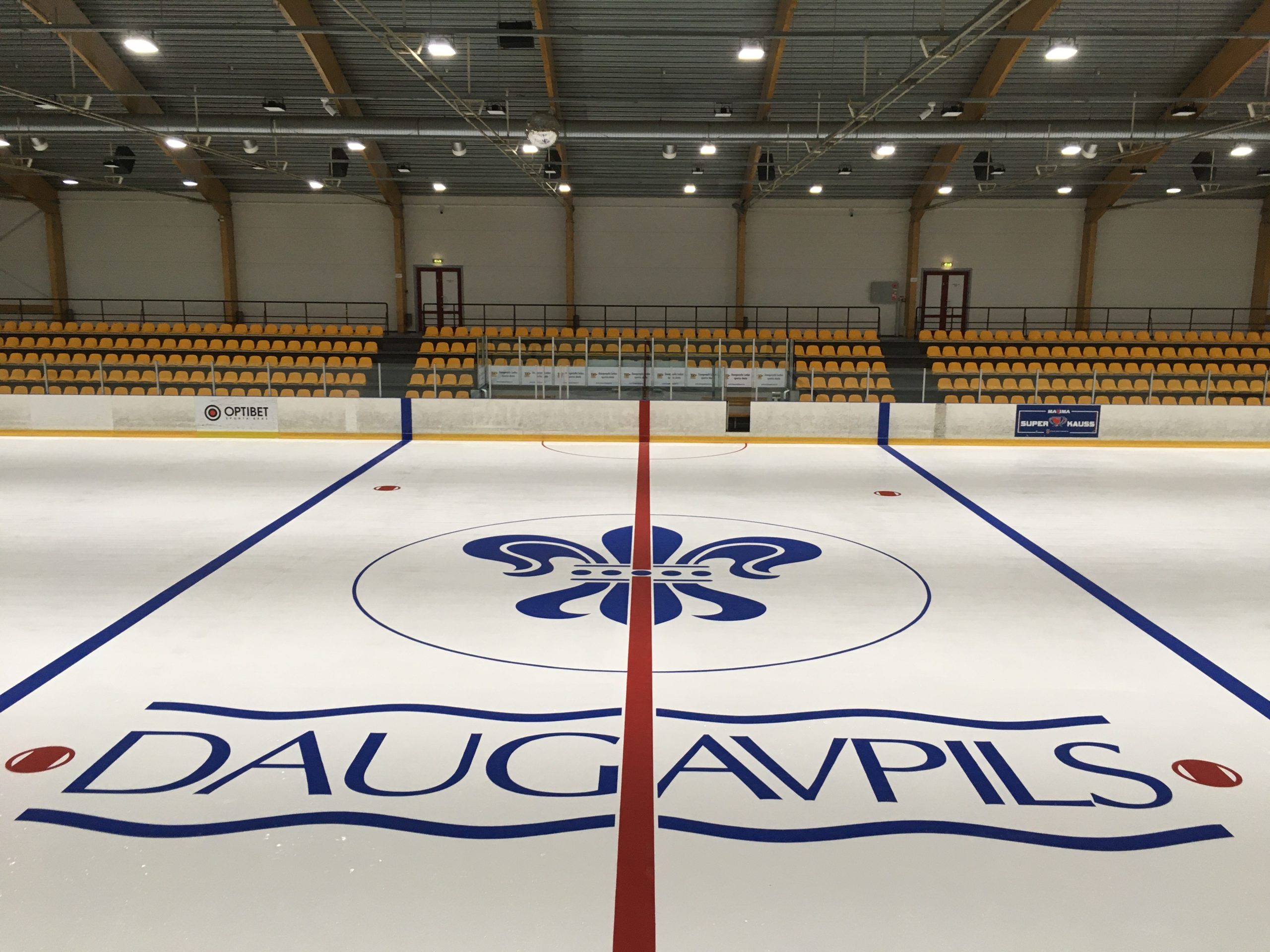
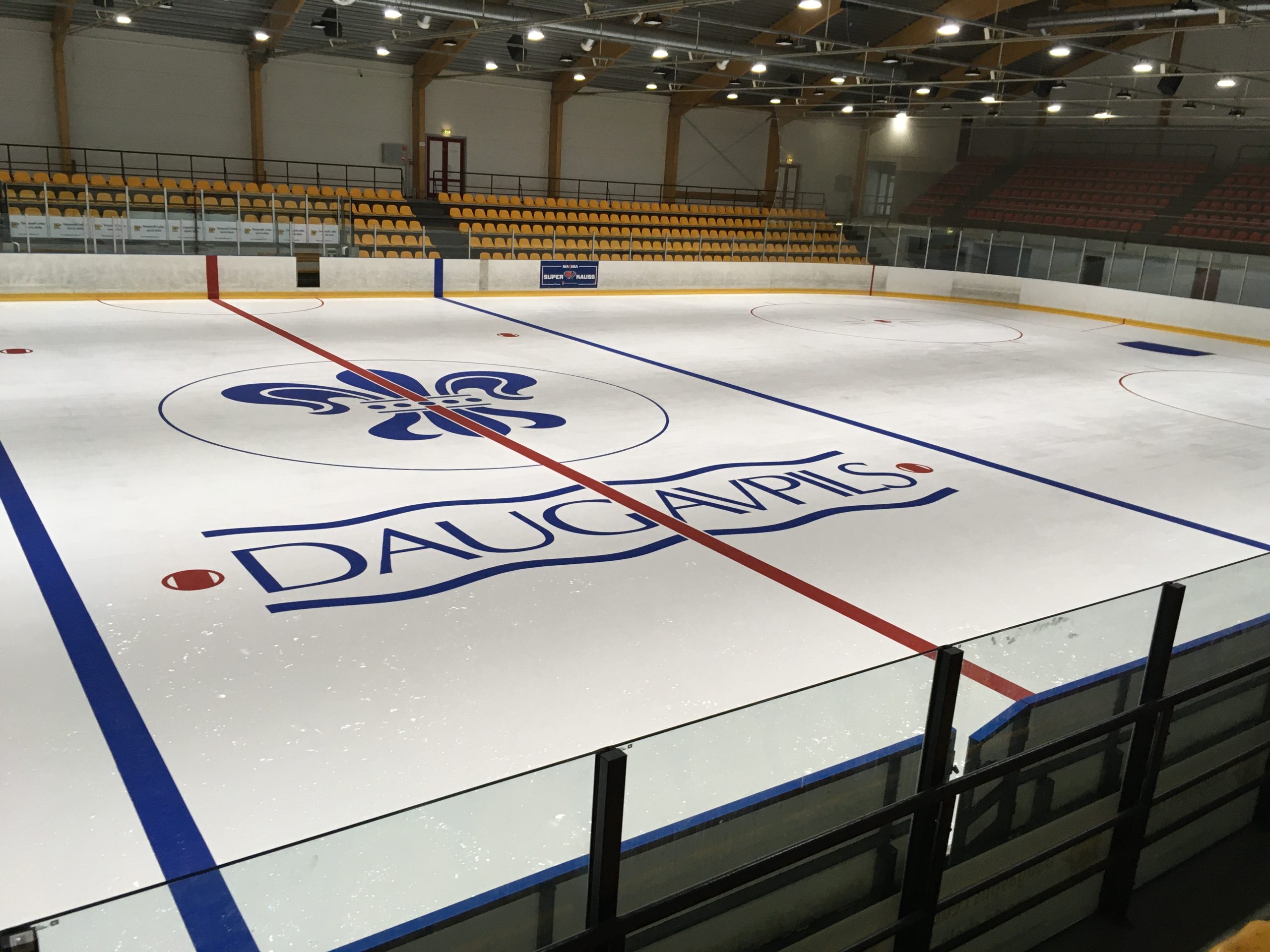
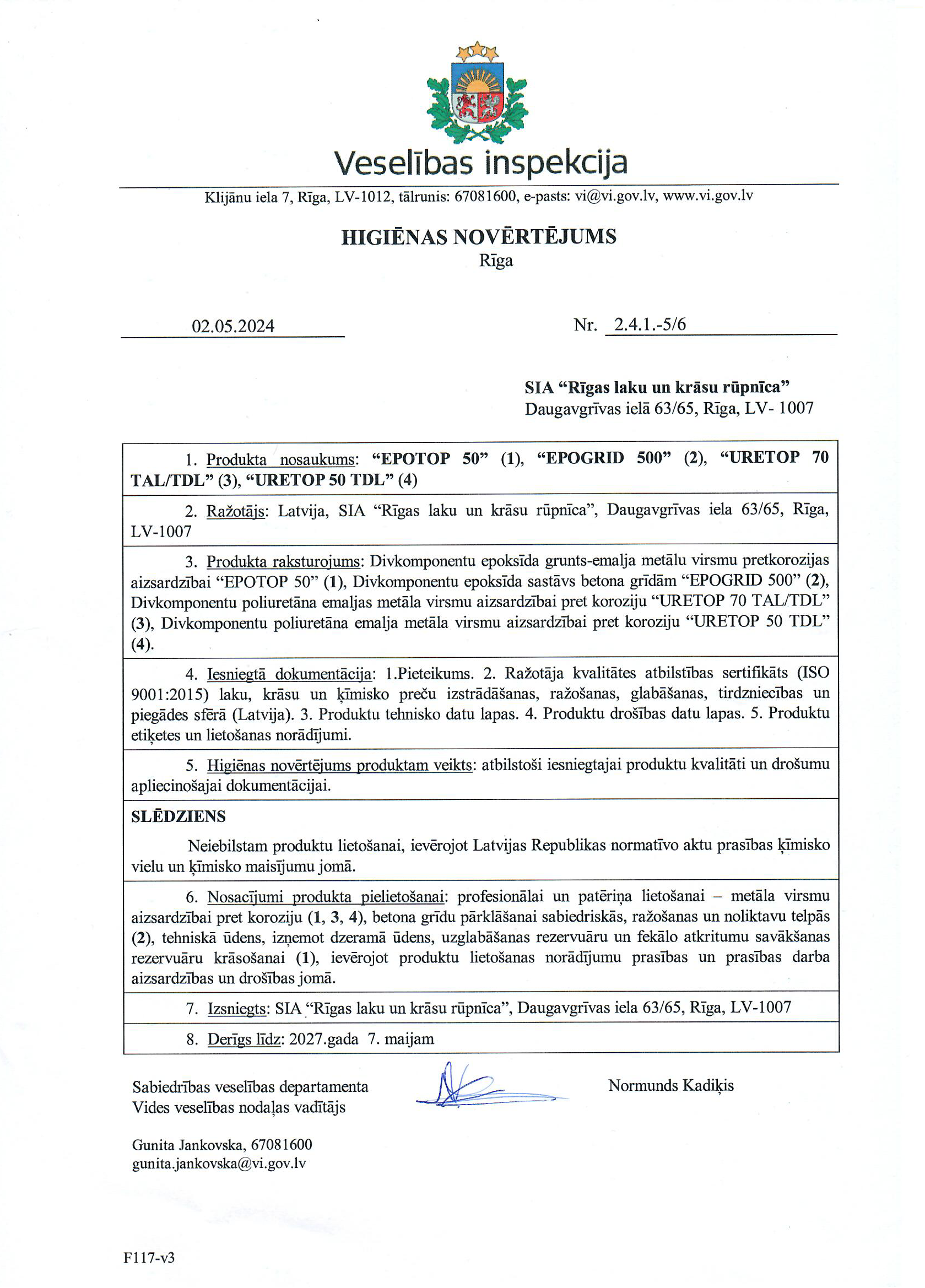
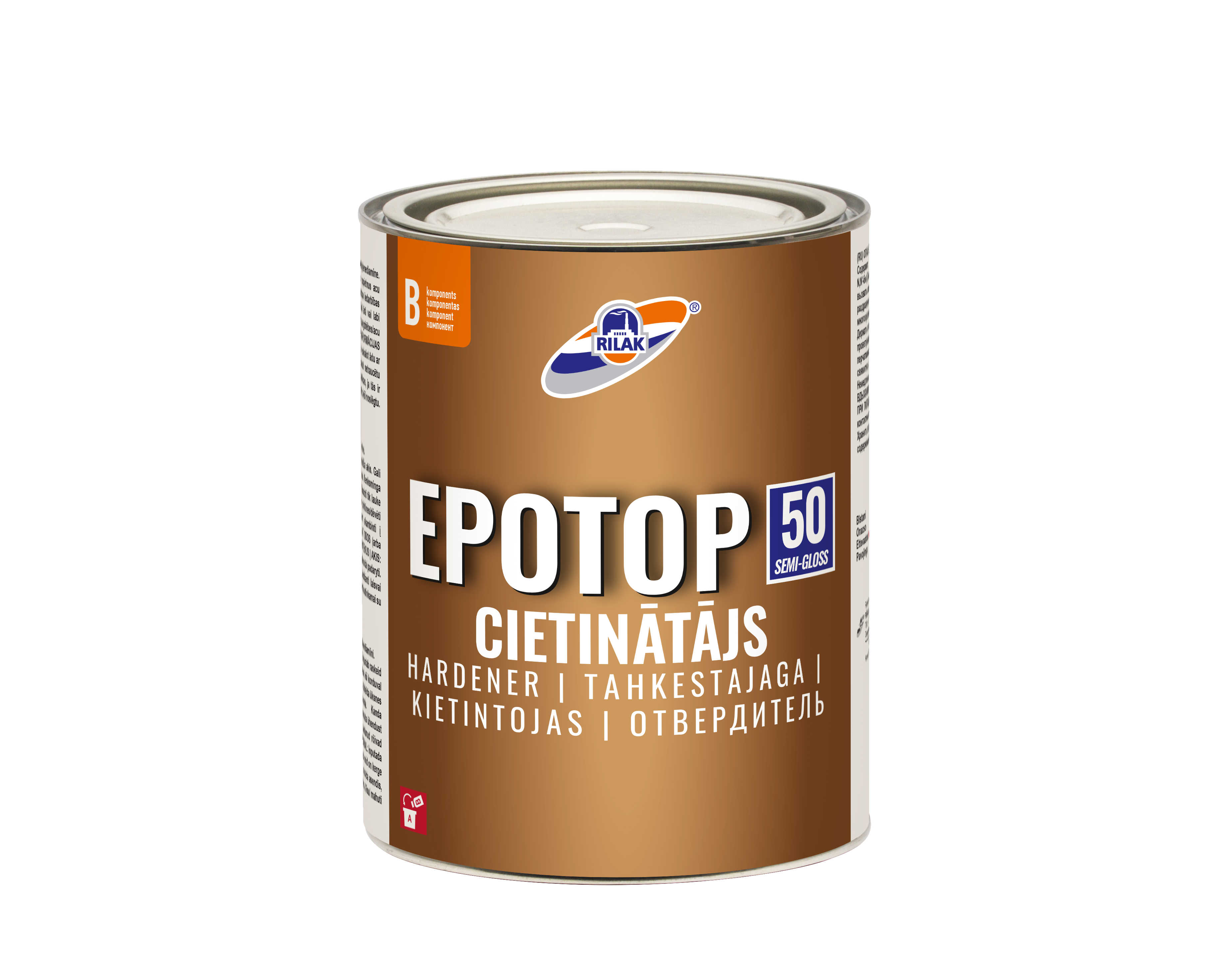
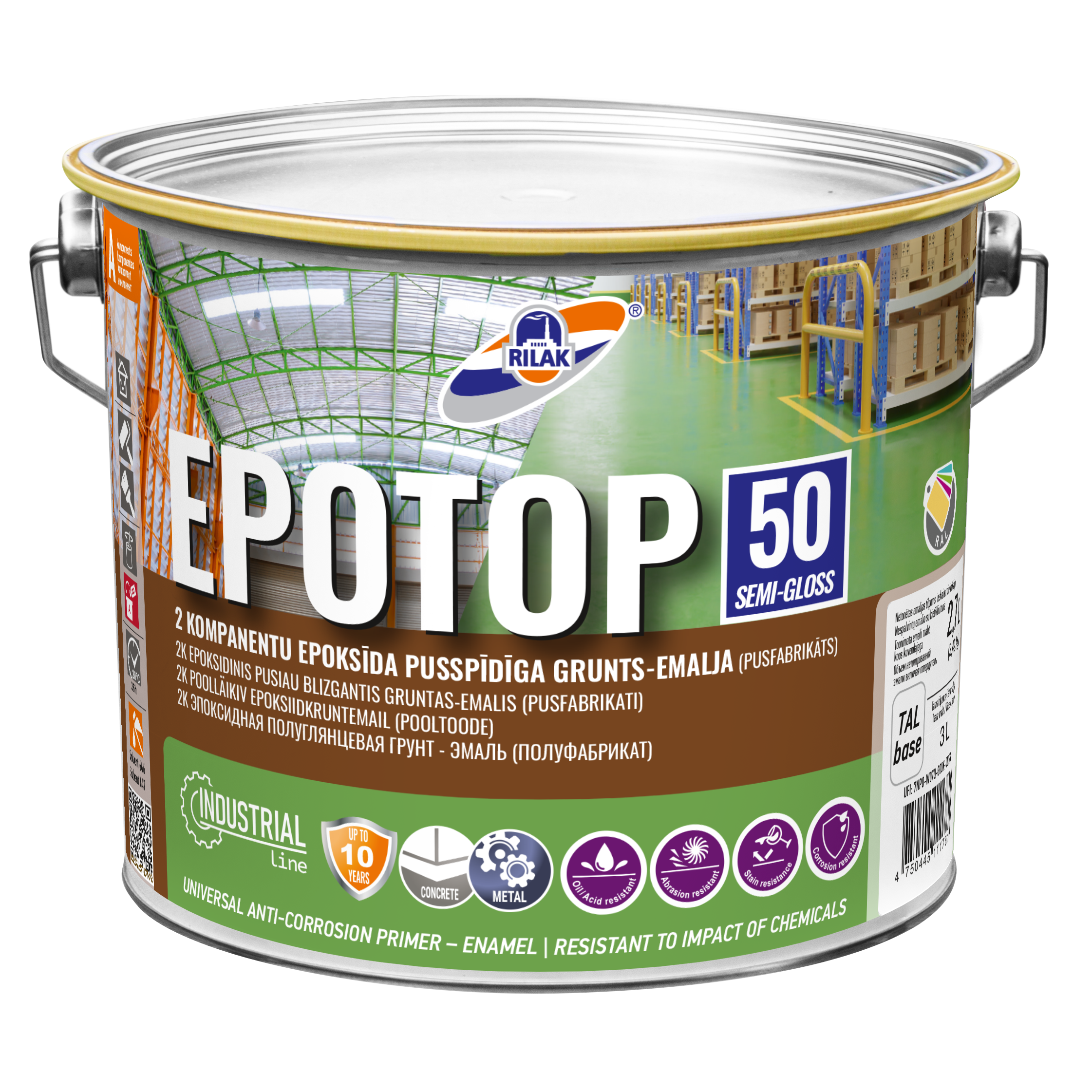













DESCRIPTION:
Two-component epoxy anti-corrosion primer-enamel. Forms a semi-gloss coating resistant to the effects of aggressive chemical agents such as petroleum products, oils, weak solutions of non-oxidizing acids, and salts. When applied to concrete floors, it increases their resistance to mechanical damage, and when used for marking concrete floors, it provides bright and long-lasting markings. The enamel can be tinted to both light and dark shades.
AREAS OF APPLICATION:
Designed for coating metal surfaces exposed to industrial and marine atmospheric conditions. Recommended for painting metal structures, industrial equipment, pipe racks, and similar applications. May also be used for painting concrete and plastered walls in food-processing industrial environments, concrete floors with medium abrasive load, as well as for various types of concrete floor markings (zone designations, arrows, indicators).
TECHNICAL PARAMETERS:
| Colour: | White (TAL base) which may be tinted in to light shades. TDL base may be tinted to dark shades using “TEMACOLOR SCALA” tinting system. |
| Gloss: | Semi- gloss |
| Drying time at 20ºC temperature: |
|
| T 0C | Drying time , h Not more than | Pot life after addition the hardener , h, not more than | Recoating interval before next coat of EPOTOP 50 | |
| h not before | days not later *) | |||
| +10 | 8 | 12 | 5 | 10 |
| +20 | 6 | 8 | 3 | 5 |
| *) If the duration till recoating is more than shown, it is recommended surface sanding to improve adhesion | ||||
| Consumption: | 8,2 ÷ 8,5 m²/ l for one layer with a dry film thickness of 60 μm (not including losses during application ) |
| Thickness of layer, mm | Necessary number of layers | Theoretical spreading rate , ( enamel with hardener ), | |
| Dry film | Wet layer ( without solvent ) | m2 / l ( g / m2 ) | |
| 60 | 120 | 1 | 8,2 – 8,5 (145–150) |
| 120 | 240 | 1 – 2 | 4,1 – 4,5 (290–300) |
| Solvent: | 646 |
| Tools used for application: | Brush, roller, paint spray |
| Storage period: | 4 years from the date of manufacture in tightly closed manufacturer’s container. |
| Packaging: | 2.7 l (3,3 kg); 9 l (11 kg) |
PREPARATION OF PRIMER FOR USE:
Mixing: Stir base thoroughly and add hardener in a ratio of 100 parts base to 20 parts hardener by weight. Mix well. After adding hardener, allow the mixture to stand for 45 minutes before use.
Dilution: If necessary, dilute to working viscosity with Solvent 646:
0–5% by volume for brush/roller
5–10% for spray application.
PREPARATION OF SURFACE:
Steel surfaces must be cleaned of rust and contaminants to a degree of Sa 21/2 or St3 before painting. Aluminum or galvanized surfaces used indoors can be painted without prior priming. Aluminum or galvanized surfaces must be degreased and lightly treated with fine-grit sandpaper or subjected to light abrasive blasting, then washed with a 5% ammonia water solution and dried.
Fresh concrete and plastered surfaces can only be painted no earlier than 28 days after installation. Lime milk must be removed from concrete surfaces before painting (see separate instructions for preparing concrete surfaces before painting). The concrete must be homogeneous and, ideally, should not contain modifying additives (polymer dispersions, curing accelerators, water-repellent additives, etc.). These additives may negatively affect the adhesion of the primer-enamel to the concrete. Therefore, if the exact composition of the concrete is unknown, a test application of the primer-enamel should be performed on a small experimental area, followed by mechanical testing for adhesion. The absolute humidity of the concrete should not exceed 4%. When applying EPOTOP 50 on previously painted surfaces, a test coating on a small area should be performed with subsequent inspection.
PRIMING OF SURFACE:
Steel surfaces exposed to atmospheric conditions and those used indoors should be primed with the EPOPRIM primer. EPOTOP 50 can be applied without prior priming. In this case, the coating thickness should be at least 120 μm.
Concrete and plastered surfaces should be primed with the primer-enamel EPOTOP 50, diluted with 646 solvent to 10% (by volume).
APPLICATION:
Apply the coating to the prepared surface in 1-2 layers using a brush, roller, sprayer, or airless spraying equipment (nozzle diameter 0.011″-0.018″) at an air and surface temperature of at least +10°C and relative air humidity not exceeding 85%.
TOOL CLEANING:
After work wash painting tools with solvent 646.
DESCRIPTION:
Two-component epoxy anti-corrosion primer-enamel. Forms a semi-gloss coating resistant to the effects of aggressive chemical agents such as petroleum products, oils, weak solutions of non-oxidizing acids, and salts. When applied to concrete floors, it increases their resistance to mechanical damage, and when used for marking concrete floors, it provides bright and long-lasting markings. The enamel can be tinted to both light and dark shades.
AREAS OF APPLICATION:
Designed for coating metal surfaces exposed to industrial and marine atmospheric conditions. Recommended for painting metal structures, industrial equipment, pipe racks, and similar applications. May also be used for painting concrete and plastered walls in food-processing industrial environments, concrete floors with medium abrasive load, as well as for various types of concrete floor markings (zone designations, arrows, indicators).
TECHNICAL PARAMETERS:
| Colour: | White (TAL base) which may be tinted in to light shades. TDL base may be tinted to dark shades using “TEMACOLOR SCALA” tinting system. |
| Gloss: | Semi- gloss |
| Drying time at 20ºC temperature: |
|
| T 0C | Drying time , h Not more than | Pot life after addition the hardener , h, not more than | Recoating interval before next coat of EPOTOP 50 | |
| h not before | days not later *) | |||
| +10 | 8 | 12 | 5 | 10 |
| +20 | 6 | 8 | 3 | 5 |
| *) If the duration till recoating is more than shown, it is recommended surface sanding to improve adhesion | ||||
| Consumption: | 8,2 ÷ 8,5 m²/ l for one layer with a dry film thickness of 60 μm (not including losses during application ) |
| Thickness of layer, mm | Necessary number of layers | Theoretical spreading rate , ( enamel with hardener ), | |
| Dry film | Wet layer ( without solvent ) | m2 / l ( g / m2 ) | |
| 60 | 120 | 1 | 8,2 – 8,5 (145–150) |
| 120 | 240 | 1 – 2 | 4,1 – 4,5 (290–300) |
| Solvent: | 646 |
| Tools used for application: | Brush, roller, paint spray |
| Storage period: | 4 years from the date of manufacture in tightly closed manufacturer’s container. |
| Packaging: | 2.7 l (3,3 kg); 9 l (11 kg) |
PREPARATION OF PRIMER FOR USE:
Mixing: Stir base thoroughly and add hardener in a ratio of 100 parts base to 20 parts hardener by weight. Mix well. After adding hardener, allow the mixture to stand for 45 minutes before use.
Dilution: If necessary, dilute to working viscosity with Solvent 646:
0–5% by volume for brush/roller
5–10% for spray application.
PREPARATION OF SURFACE:
Steel surfaces must be cleaned of rust and contaminants to a degree of Sa 21/2 or St3 before painting. Aluminum or galvanized surfaces used indoors can be painted without prior priming. Aluminum or galvanized surfaces must be degreased and lightly treated with fine-grit sandpaper or subjected to light abrasive blasting, then washed with a 5% ammonia water solution and dried.
Fresh concrete and plastered surfaces can only be painted no earlier than 28 days after installation. Lime milk must be removed from concrete surfaces before painting (see separate instructions for preparing concrete surfaces before painting). The concrete must be homogeneous and, ideally, should not contain modifying additives (polymer dispersions, curing accelerators, water-repellent additives, etc.). These additives may negatively affect the adhesion of the primer-enamel to the concrete. Therefore, if the exact composition of the concrete is unknown, a test application of the primer-enamel should be performed on a small experimental area, followed by mechanical testing for adhesion. The absolute humidity of the concrete should not exceed 4%. When applying EPOTOP 50 on previously painted surfaces, a test coating on a small area should be performed with subsequent inspection.
PRIMING OF SURFACE:
Steel surfaces exposed to atmospheric conditions and those used indoors should be primed with the EPOPRIM primer. EPOTOP 50 can be applied without prior priming. In this case, the coating thickness should be at least 120 μm.
Concrete and plastered surfaces should be primed with the primer-enamel EPOTOP 50, diluted with 646 solvent to 10% (by volume).
APPLICATION:
Apply the coating to the prepared surface in 1-2 layers using a brush, roller, sprayer, or airless spraying equipment (nozzle diameter 0.011″-0.018″) at an air and surface temperature of at least +10°C and relative air humidity not exceeding 85%.
TOOL CLEANING:
After work wash painting tools with solvent 646.
Find out how much of the product You will need.
Daugavgrīvas iela 63/65, Rīga, LV-1007
Reģistrācijas Nr.: 40003284444
PVN Nr.: LV40003284444
Banka: A/S Swedbank
Konts: LV23HABA0019308047593
Bankas kods: HABALV22